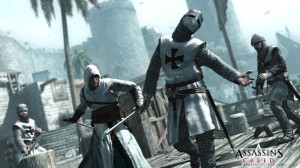Years ago my husband was playing a video game, and one night I was terribly annoyed at all the shooting/lancing noises that ricocheted through our living room and into my study while I was trying to write a paper. I didn’t think it would be fair to ask him to turn it off, and I knew the volume was way down – its not his fault our halls echo so much. But I did poke my head out and issue a slight glare in the general direction of the screen. In an attempt to engage me in the game he explained that it was set in medieval times, and was loosely based upon the history of the Crusades. Well, I remained thoroughly unconvinced that this game was any good.
A month ago I was perusing sites looking at various CFPs, and one theme that I saw reemerging at a couple of conferences was medievalism in popular culture. The most prevalent example, and one which I think many will jump on was Game of Thrones. However, I am not suited to really discuss that as I am well behind on the books and series. But I thought it just sounded like such a fun presentation idea I didn’t want to give up on it so I began enumerating all the medieval inspired shows/games/etc. I could write about and that perhaps wouldn’t be as prominently featured elsewhere. Hrm….
Oh wait, didn’t the husband say something or other years ago about that one game set in the Middle Ages?
After a bit of research (some of which involved actually playing the game) I couldn’t really find anything extraordinary about it. It is set in the Middle Ages… ok… so what?
I reread about the premise of the game, and looked at various characters portrayed. I mulled it over, and while ignoring it altogether this idea came to me (which required further research and more mulling over). In short, this is the proposal I just submitted for the topic of medievalism in popular culture to the PCA/ACA conference (hopefully it will get accepted):
The popular video game, Assassin’s Creed, is a modernized and highly embellished built upon version of the feud between the medieval Assassins of the east the the Crusaders of the west. However, what is most noteworthy about the premise is the context in which it is used. The Crusades, ubiquitously associated with Western culture and Christianity become inverted within the video game as the players (typically westerners) take on the role of the Assassins, literally placing themselves in the role of the “other.” Large portions of the game take place in medieval milieus, notably Masyaf in Syria, a land that has had great global consequence today. This paper would like to argue that through the violence in the video game’s premise, it brokers pacifism, understanding, and tolerance.
Arguably the road towards pacifism is not a conscious undertaking the players participate in, but it nevertheless opens the line of communication between the past and present. Moreover, it familiarizes the general population with these past events, cultivating a curiosity for further research into the history behind the video game as is made apparent by the numerous websites which have sprouted up in recent years that are dedicated to separating out fact from fiction within the plot.
The medieval conflict between the Knights and Assassins in Assassin’s Creed is sufficiently distanced from the modern period to allow dissociation while nevertheless providing the impetus necessary to learn about points in history that have shaped our culture today from the perspective of another.






